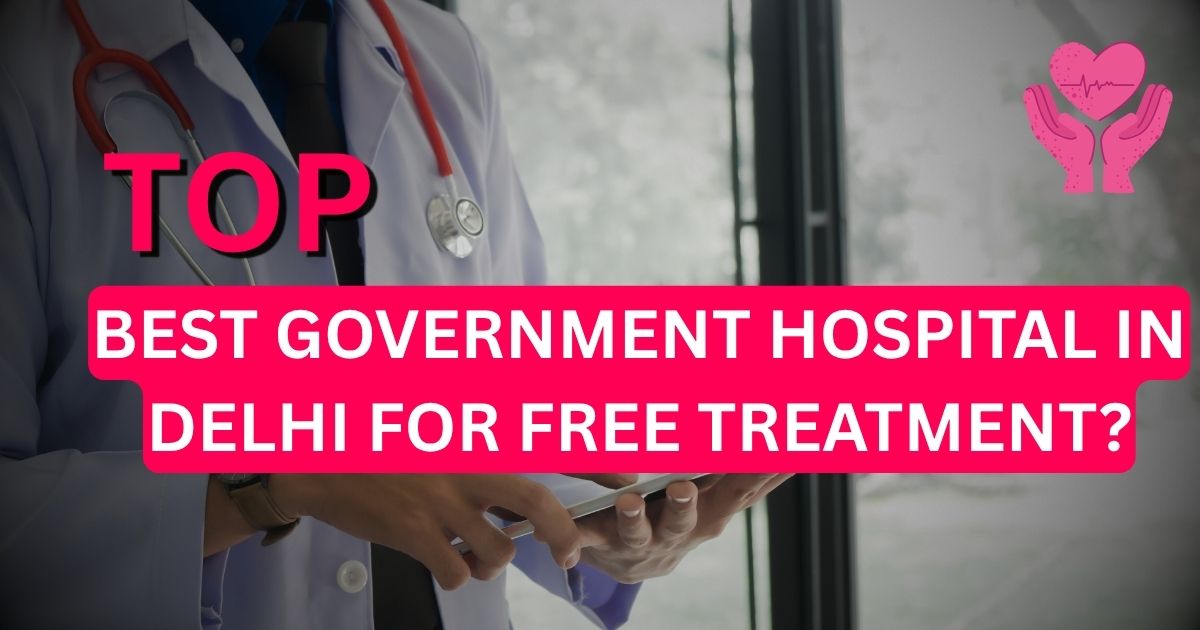Best Government Hospital in Delhi – When it comes to healthcare, Delhi stands out as one of India’s most medically advanced cities. While private hospitals in Delhi offer premium services, they are often expensive for common citizens. That’s where government hospitals step in as a lifeline for millions of people every year. But which is the best government hospital in Delhi for free treatment? If you’re searching for quality care that’s affordable — or entirely free — this guide is for you.
Why Government Hospitals in Delhi Matter
In India, government hospitals form the backbone of the healthcare system. Especially in a metropolis like Delhi — home to over 20 million people — public hospitals handle a massive patient load daily.
Here’s why they matter:
- Free or Subsidised Treatment: Most services, tests, surgeries, and medicines are provided free or at nominal rates.
- Expert Doctors: Many government hospitals in Delhi have some of the country’s most qualified doctors, surgeons, and specialists.
- Research and Innovation: Institutions like AIIMS Delhi are also top research hubs, often first to adopt new technologies and treatment protocols.
- Wide Range of Specialties: From routine check-ups to highly complex surgeries like organ transplants, government hospitals cover it all.
The Best Government Hospital in Delhi for Free Treatment: AIIMS Delhi
Without doubt, the All India Institute of Medical Sciences (AIIMS), New Delhi, stands tall as India’s premier government hospital for free treatment.
Why AIIMS Delhi?
Established in 1956 by an Act of Parliament, AIIMS is consistently ranked as India’s best government hospital. It is a referral hospital for the entire nation — patients from every corner of India, and even neighboring countries, come here for advanced treatments they can’t afford elsewhere.
Key Features:
- World-class doctors and specialists.
- 24×7 emergency and trauma services.
- Advanced diagnostic labs and research facilities.
- Highly subsidised or free treatments for patients below the poverty line.
- Specialized centers for cardiac care, cancer treatment, neurosurgery, pediatrics, burns, and more.
Annual Footfall: AIIMS sees nearly 3 million OPD patients and performs over 1 lakh surgeries every year — a testament to its trust factor.
Official Website: AIIMS Delhi
Departments and Specialties at AIIMS Delhi
If you want to know why it’s regarded as the best, just look at its scope:
1. Cardiology & Cardiac Surgery
AIIMS Delhi is known for complex heart surgeries, including pediatric cardiac care for children born with congenital heart defects.
2. Oncology
The Dr. B.R. Ambedkar Institute Rotary Cancer Hospital at AIIMS offers cutting-edge cancer treatment, chemotherapy, radiotherapy, and surgical oncology.
3. Neurosciences
One of India’s busiest departments for brain and spinal surgeries. It handles trauma cases, tumors, epilepsy surgery, and more.
4. Organ Transplants
From kidney to liver transplants, AIIMS has successfully conducted thousands of complex organ transplant surgeries.
5. Pediatrics
Dedicated children’s hospital within the AIIMS campus offers specialized care for infants, children, and adolescents.
6. Ophthalmology
Dr. Rajendra Prasad Centre for Ophthalmic Sciences is Asia’s largest eye care facility.
7. Orthopedics, ENT, Gastroenterology, Pulmonology, and nearly every specialty is covered under one campus.
Who is Eligible for Free Treatment at AIIMS Delhi?
AIIMS operates with a mission to provide quality healthcare regardless of financial background. While some treatments may have subsidised costs, many essential services are free, especially for:
- Patients with Below Poverty Line (BPL) certificates.
- Economically Weaker Sections (EWS).
- Individuals covered under government health schemes like Ayushman Bharat or Delhi Arogya Kosh.
Patients may need to submit income proof and relevant documents during registration.
How to Get Treatment at AIIMS Delhi
1. Get a Registration Card: New patients must register for an OPD card. Registration can be done online via the AIIMS online portal or at the hospital counters.
2. Consult at OPD: You’ll be assigned a date and department. Consultations are often done in phases — initial check-ups, tests, and follow-ups.
3. Tests and Diagnostics: Blood tests, imaging, and biopsies are either free or heavily subsidised.
4. Surgery and Admission: If surgery is needed, you’ll be placed on a waiting list (this can be long for non-emergency cases). Emergency procedures are prioritized.
5. Medicines: AIIMS runs an in-house pharmacy that provides free or discounted medicines for inpatients and outpatients.
Other Top Government Hospitals in Delhi for Free or Affordable Care
While AIIMS is the best overall, Delhi has several other well-reputed government hospitals. Here’s a quick list:
1. Safdarjung Hospital
- One of India’s largest multi-specialty hospitals.
- Offers free surgeries, maternity care, and emergency services.
- Popular for trauma and burns treatment.
2. Ram Manohar Lohia Hospital (RML)
- Centrally located with modern facilities.
- Renowned for general medicine, cardiology, and ENT.
- Operates a 24×7 emergency and trauma center.
3. Lok Nayak Jai Prakash Narayan Hospital (LNJP)
- Delhi’s main COVID-19 care center during the pandemic.
- Strong in infectious diseases, TB, and respiratory medicine.
- Affordable treatments for urban poor.
4. Guru Teg Bahadur Hospital (GTB)
- East Delhi’s biggest government hospital.
- Linked to University College of Medical Sciences.
- Free maternity, pediatrics, and general medicine.
5. Dr. Baba Saheb Ambedkar Hospital
- Modern government hospital in Rohini.
- Multi-specialty services including dialysis, cardiac care, and surgery.
- All treatments are subsidised.
Tips to Navigate Government Hospitals in Delhi
Getting treatment in a government hospital can be challenging due to huge crowds and long wait times. Here’s how to manage it:
- Register Online: Use ORS.gov.in to book OPD appointments for many government hospitals in Delhi.
- Carry Documents: Always bring your ID proof, income certificate, BPL card (if applicable), and previous medical records.
- Reach Early: OPD counters often open at 8 AM but queues start much earlier. Arriving early helps you get a better spot.
- Be Patient: Understand that government hospitals cater to thousands daily — patience and cooperation help.
- Seek Help: Don’t hesitate to ask hospital staff for directions; many hospitals have help desks or volunteers to guide you.
Pros and Cons of Choosing Government Hospitals for Free Treatment
Pros:
- Zero or very low cost for consultations, surgeries, and medicines.
- Highly qualified and experienced doctors.
- Advanced facilities and equipment in premier hospitals like AIIMS.
- Access to specialty care for rare or complicated conditions.
Cons:
- Long waiting periods, especially for non-emergency surgeries.
- Overcrowding in OPDs and wards.
- Limited personalized attention compared to private hospitals.
- Bureaucratic paperwork for eligibility proof.
Alternative: Central Government Health Scheme (CGHS)
If you are a government employee or pensioner, you may be eligible for the CGHS scheme. It allows you to access a network of empanelled hospitals, including private ones, for cashless treatment. For more details, check the official CGHS website.
Final Thoughts: Is AIIMS the Right Choice for You?
So, which is the best government hospital in Delhi for free treatment? The answer is clear: AIIMS Delhi remains the gold standard — not just for its free or subsidised care but for its unmatched quality, experienced doctors, and advanced infrastructure.
However, depending on your location and urgency, hospitals like Safdarjung, RML, or LNJP can be excellent alternatives. Remember: timely diagnosis and treatment are vital, so choose a hospital that’s accessible and suits your condition best.
Conclusion
Government hospitals in Delhi are more than just buildings — they are lifelines for millions who cannot afford expensive private care. While these hospitals face challenges like overcrowding and waitlists, they continue to deliver hope and healing to countless families.
If you or your loved ones need treatment but worry about medical costs, remember you have options. From AIIMS to Safdarjung Hospital, Delhi’s public hospitals ensure that no one is denied quality healthcare due to financial constraints.

